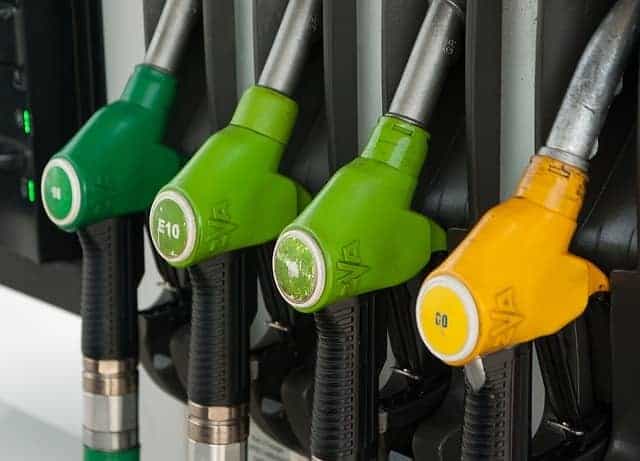
When it comes to fueling up your motorcycle, it can be a little confusing once you’re at the pump and left to decide which button you should push to start dispensing gas into the tank. By this point, you probably know that it actually does matter what you end up putting into your gas tank.
Any type of gas with probably get you to where you want to go. But the wrong kind of gas can eventually cause a few problems down the road that you likely don’t want to deal with.
So what kind of gas do motorcycles use? The kind of gas motorcycles should use is ethanol-free higher octane gasoline (no less than a 91 rating). Motorcycles are considered to have high compression engines which is something that requires high octane. Ethanol is an additive in gas that is used to boost the octane but it can eventually clog up motorcycle carburetors.
As a mechanical engineer that works for an oil company, I’ve been able to get a good idea about how gasoline works and the effects it has on a motorcycle. I’ve compiled a helpful guide that will assist you in making the right decision when it comes to putting gas in your motorcycle.
The Right Kind Of Gas A Motorcycle Needs
If you’re reading this, you’re probably stuck wondering what the best type of gas is needed for your motorcycle and if it really matters if you choose the right one. Most people assume that as long as the motorcycle has some type of gas, it’ll get them from point A to point B and that’s all the really matters.
There are some things added to fuel by oil companies that is intended to help us out in the long run. But sometimes those additives can actually impact our motorcycles in a negative way. It’s important you know exactly what you’re putting into your motorcycle so you can better care for it so it will better care for you.
Motorcycles need to use ethanol-free higher octane gasoline. Motorcycles that have a carburetor especially need to use ethanol-free gas because ethanol is a gasoline additive that boosts the octane of gasoline. But when it’s in small tight places, such as your carburetor, it can gum up a lot faster than gas that has no ethanol in it.
About 90% of gas stations use ethanol in their gas. That’s why you see a sign at the pump that states “May Contain Up To 10% Ethanol.” The catalyzing effect ethanol has on octane helps it to maintain it’s burning efficiency.
It’s a type of hydrocarbon that oil refineries use to bump up their octane numbers so they can meet government regulations on gas emissions. Lower octane fuels aren’t going to burn as well and they’re going to burn off more noxious gases.
Motorcyclists need to be specific about the gas station they go to and find a gas station that states it has ethanol-free gas. That’s not to say that if you are left with no choice but to use gas with ethanol your carburetor will gum up immediately, just make it a habit of normally using ethanol-free gas. Ethanol-free gas is a little more expensive because it has higher value product that goes into it.
While you’re at the pump, you need to choose the highest octane rating available, meaning choosing the highest number. For example, you may be presented with Regular which may have an octane rating of 87, Plus which have an octane rating of 89, and Premium which may have an octane rating of 93. In this case, you’ll want to choose the Premium gas because it has the highest octane rating.
Fuel injected motorcycles tend to not gum up like carbureted motorcycles do. But still be wary of what gas you use because most new motorcycles are fuel injected and most of them still have a high compression ratio. If you have a high compression ratio, manufacturers generally specify that you should use a premium, non-ethanol gasoline.
So no matter what type of motorcycle you have whether it be carbureted or fuel injected, it’s better to use a higher octane (91 or higher) fuel that is ethanol-free for all motorcycles.
What Is Octane And Why Is it Important?
Now that we’ve covered the best type of gas needed for your motorcycle, you may be wondering about the octane we discussed and why it’s an important factor in the way you choose your fuel.
Octane is the measurement of the performance of a certain type of gasoline. Octane doesn’t necessarily increase horsepower, torque, or fuel efficiency. Rather, octane assists with the engine’s performance and the fuel’s resistance to knocking. And since most motorcycles are considered to have high compression engines, high octane gasoline is vital.
Knocking is when your engine is at high RPM and you actually start hearing a knocking sound coming from your engine. That’s the sound of the piston either touching a valve or the bottom skirt of the engine is touching the cylinder wall. A higher octane will resist that knocking better than a lower octane.
Again, octane is the number that you see on the buttons at the gas pump such 83, 85, 91, etc. During certain seasons, you’re going to see different numbers. During the winter you may not get as high of octane fuel choices.
There are several apps that you can download on your phone, such as gasbuddy, that will tell you where the nearest gas station is, who has the lowest prices, and even tell you whether or not the gas is ethanol-free.
What Happens When You Use The Wrong Type Of Gas
Depending on where you live, the price of gas can be a bit atrocious. Actually, maybe no matter where you live it can be the same case. Either way, we’re all trying to save a buck in any place that lets us. Unfortunately most people who fill us their gas tank, even motorcyclists, end up using the lowest octane rating because it usually the cheapest by a long shot.
Trust me, I’ve done this way too many times myself, especially when I was a poor college student where literally every dollar counted. But keep in mind that if you don’t use the right gas in your motorcycle, that can actually cause some expensive problems in the future.
When using a lower octane rating on a motorcycle, you may notice the performance of our engine isn’t as good as it used to be. As it was mentioned before, higher octane helps prevent engine knocking, so using a lower octane level won’t protect your engine near as much.
You risk the health of your motorcycle’s engine using a lower octane gas. Motorcycle engines especially need protection from the knocking that happens from pistons at a high RPM. This will eventually cause wear on the valves, pistons, and the cylinder walls. That’s a lot more expensive to fix compared to paying an extra $4-$5 dollars every time you fill up.
Do Fuel Additives Affect Gas?
There are plenty of fuel additives out there available for us riders to add to the gas in our motorcycles. The most common type of additive is a stabilizer to help maintain the gasoline that’s inside the tank and fuel system during long-term or winter storage.
I’ve often wondered if adding such additives impacts the ethanol or octane that is contained within the gasoline already (if ethanol is even present). A fuel additive actually has it’s own octane number so technically it would change the octane number of the gasoline that’s already in the tank.
So yes, additives do change the chemistry within gasoline slightly, but the change is so small that it doesn’t really matter or change the way your motorcycle or gasoline functions. It won’t cause any negative effects.
So rest easy if you have to use some sort of fuel additive to maintain the life of your gasoline. The consequences of not using additives in certain situations are far more severe than worrying about changing the octane levels within the gasoline.
Related Questions
How long does it take for gas to go bad in a motorcycle? Unstabilized gas in a motorcycle can start going bad in about 30 days. The exposure to oxygen eventually changes the chemistry of gas which can lead to gum and varnish deposits. Gas should not be used if it has been sitting for longer than 6 months. For more information about the life of gasoline, see my other article here.
Is there such thing as a diesel motorcycle? There are diesel motorcycles available. This is a motorcycle that has a diesel engine. However, they are not that common and can be pretty difficult to come by because the concept never really took off.

